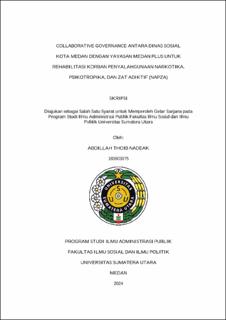| dc.description.abstract | The Medan City is one of the drug hubs in North Sumatra, as evidenced by
the high rate of drug abuse cases. The high rate of drug abuse disrupts social,
health and economic life. Therefore, victims of drug abuse need to receive
medical and social rehabilitation. One of them is the rehabilitation carried out by
the Medan City Social Office and Medan Plus Foundation. The Medan City Social
Office as a government actor and Medan Plus Foundation as a non-government
actor in carrying out rehabilitation of drug abuse victims is a form of
collaborative governance. Collaboration between the two actors is driven by gaps
in resources and facilities to carry out rehabilitation of drug abuse victims, thus
becoming the starting condition underlying the collaboration. This research aims
to know, describe, and analyze collaborative governance between Medan City
Social Office and Medan Plus Foundation for the rehabilitation of drug abuse
victims.
This research uses descriptive research method with qualitative approach.
Data collection was carried out using interview techniques, observation,
documentation, and literature. The data obtained were analyzed qualitatively
using the collaborative governance model according to Ansell and Gash which
consists of several stages, namely: starting conditions, institutional design,
facilitative leadership, and collaborative processes.
The research results show that: First, the starting condition between the
Medan City Social Office and Medan Plus Foundation went well and there was
never conflict. Second, the institutional design that regulates drug rehabilitation
services is structured from the national to the regional level. Third, facilitative
leadership is said to be good because the Medan City Social Office can lead
collaboration to generate targets in handling victims of drug abuse. Fourth, the
collaborative process in drug rehabilitation goes well between the two parties
which is manifested in face-to-face dialogue that creates a sense of trust,
commitment, and mutual understanding based on regulations and work contracts.
Overall, collaborative governance between the Medan City Social Office and
Medan Plus Foundation is going well although there are recommendations,
namely that both should remind each other and invite to hold meetings to
collaborate. | en_US |





